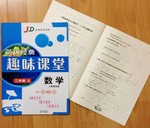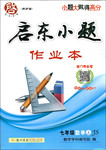题目内容
Scientists have tried to come up with biological explanations for the difference between boys and girls. However, none were believable enough to explain the general picture. As one scientist points out, “There are slight genetic(遗传的)differences between the sexes at birth which may affect the subjects boys and girls choose. But the difficulty is that by the time children reach school age, there are so many other effects that it is almost impossible to tell whether girls are worse at science and maths, or they’ve been brought up to think of these subjects as boys’ ‘territory’(领域)”.
Statistics(统计数据)show that in mathematics, at least, girls are equal to boys. A recent report suggests that girls only stop studying mathematics because of social attitudes. One of the reports’ authors says, “While it is socially unacceptable for people not to be able to read and write, it is sill acceptable for women to say that they are ‘hopeless’ at maths. Our research shows that, although girls get marks which are as good as the boys’ , they have not been encouraged to do so.”
The explanation for the difference, which is very clear during the teenage years, goes as far back as early childhood experiences. From their first days in nursery school, girls are not encouraged to work on their own or to complete tasks, although boys are. For example, boys and not girls, are often asked to ‘help’ with repair work. This encouragement leads to a way of learning how to solve problems later on in life. A further report on maths teaching shows that teachers seem to give more attention to boys than to girls. Most teachers who took part in the study admitted that they expect their male students to do better at mathematics and science subjects than their females students. All of this tends to encourage boys to work harder in these subjects, gives them confidence(信心)and makes them believe that they can succeed.
Interestingly, both boys and girls tend to regard such ‘male’ subjects like mathematics and science as difficult. Yet it has been suggested that girls avoid mathematics courses, not because they are difficult, but for social reasons. Mathematics and science are mainly male subjects, and therefore, as girls become teenagers, they are less likely to take them up. Girls do not seem to want to be in open competition with boys. Neither do they want to do better than boys because they are afraid to appear less female and less attractive.
41.According to scientific studies, girls .
A.are poorer at maths
B.avoid maths because of social reasons
C.are afraid of maths because they are the weaker sex
D.can’t learn maths as well as boys
42.Male students do better at mathematics and science subjects because .
A.they get more encouragement
B.they want to be attractive
C.they are born good at maths and science
D.they work harder in these subjects
43.Which of the following is true according to the text?
A.It seems socially acceptable for a girl not to be able to read and write.
B.It is a social problem rather than a problem of brains that girls are poor at maths.
C.Mathematics and science are no easy subjects to women.
D.Male scientists have stronger ability in maths.
44.What would be the best title for the text?
A.Who’s afraid of Maths at all?
B.Are Boys Cleverer than Girls?
C.Boys are Better at Maths than Girls by Birth
D.Maths A Difficult Subject
45.What can probably be regarded as “female ” subjects by boys and girls?
A.Maths B.Physics C.Chemistry D.English
41.B 42.A 43.B 44.B 45.D

 黄冈经典趣味课堂系列答案
黄冈经典趣味课堂系列答案 启东小题作业本系列答案
启东小题作业本系列答案